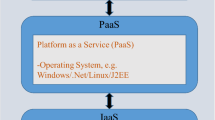Abstract
A task scheduling algorithm is an effective means to ensure multi-core processor system efficiency. This paper defines the task scheduling problem for multi-core processors and proposes a multi-objective constraint task scheduling algorithm based on artificial immune theory (MOCTS-AI). The MOCTS-AI uses vaccine extraction and vaccination to add prior knowledge to the problem and performs vaccine selection and population updating based on the Pareto optimum, thereby accelerating the convergence of the algorithm. In the MOCTS-AI, the crossover and mutation operators and the corresponding use probability for the task scheduling problem are designed to guarantee both the global and local search ability of the algorithm. Additionally, the antibody concentration in the the MOCTS-AI is designed based on the bivariate entropy. By designing the selection probability in consideration of the concentration probability and fitness probability, antibodies with high fitness and low concentration are selected, thereby optimizing the population and ensuring its diversity. A simulation experiment was performed to analyze the convergence of the algorithm and the solution diversity. Compared with other algorithms, the MOCTS-AI effectively optimizes the scheduling length, system energy consumption and system utilization.







Similar content being viewed by others
References
Baruah, S., Bertogna, M., Buttazzo, G.: Multiprocessor Scheduling for Real-Time Systems. Springer, Berlin (2015)
Lee, J.: Improved schedulability analysis using carry-in limitation for non-preemptive fixed-priority multiprocessor scheduling. IEEE Trans. Comput. 66(10), 1816–1823 (2017)
Carlos, A.R.C., Zou, X., Cheng, A.M.K.: Real-time multiprocessor scheduling algorithm based on information theory principles. IEEE Embed. Syst. Lett. 9(4), 93–96 (2017)
Wang, J., Gong, B., Liu, H.: Heterogeneous computing and grid scheduling with hierarchically parallel artificial immune optimization algorithms. ICIC Express Lett. Part B 5, 917–923 (2014)
Lin, S.W., Ying, K.C.: Minimizing makespan in a blocking flowshop using a revised artificial immune system algorithm. Omega 41(2), 383–389 (2013)
Castro, L.R.D., Timmis, J.: Artificial Immune Systems: A New Computational Intelligence Paradigm. Springer, New York (2002)
Srinivas, N., Deb, K.: Multiobjective optimization using nondominated sorting in genetic algorithms. Evolut. Comput. 2(3), 221–248 (1994)
Horn, J., Nafpliotis, N., Goldberg, D.E.: A Niched Pareto genetic algorithm for multiobjective optimization. In: Fogarty, T.C. (ed.) Proceedings of the 1st IEEE Congress on Evolutionary Computation, pp. 82–87. IEEE, Piscataway (1994)
Fonseca, C.M., Fleming, P.J.: Genetic algorithms for multiobjective optimization: formulationdiscussion and generalization. In: International Conference on Genetic Algorithms, pp. 416–423. Morgan Kaufmann Publishers Inc., Burlington (1993)
Deb, K., Pratap, A., Agarwal, S.: A fast and elitist multiobjective genetic algorithm: NSGA-II. IEEE Trans. Evolut. Comput. 6(2), 182–197 (2002)
Gong, M., Jiao, L., Yang, D.: Corrections on the box plots of the coverage metric in multiobjective immune algorithm with nondominated neighbor-based selection. Evolut. Comput. 17(1), 131 (2009)
Gong, M.G., Jiao, L.C., Du, H.F.: Multi-objective immune algorithm with nondonminated neighbor-based selection. Evolut. Comput. 16(2), 225–255 (2008)
Mu, C., Jiao, L., Liu, Y.: Multiobjective nondominated neighbor coevolutionary algorithm with elite population. Soft Comput. 19(5), 1329–1349 (2015)
Meng, X.F., Xie, W.L.: Research on P2P task scheduling with multi-objective constraints based on immune algorithm. Acta Electron. Sin. 39(1), 101–107 (2011)
Li, Z.Y., Chen, S.M., Yang, B.: Multi-objective memetic algorithm for task scheduling on heterogeneous cloud. Chin. J. Comput. 39(2), 377–390 (2016)
Lee, Y.C., Zomaya, A.Y.: An artificial immune system for heterogeneous multiprocessor scheduling with task duplication. In: International Parallel and Distributed Processing Symposium. DBLP, pp. 1–8 (2013)
Zhong, Y., Zhang, L., Li, P.: Sub-pixel mapping based on artificial immune systems for remote sensing imagery. Pattern Recognit. 46(11), 2902–2926 (2013)
Chou, C.L.: Marculescu. FARM: fault-aware resource management in NoC-based multiprocessor platforms. In: IEEE Design, Automation and Test in Europe Conference and Exhibition, pp. 1–6 (2011)
Dick, R.P., Rhodes, D.L., Wolf, W.: TGFF: task graphs for free. In: IEEE Proceedings of the Sixth International Workshop on Hardware/Software Codesign, 1998 (CODES/CASHE ’98), pp. 97–101 (1998)
Duenha, L., Guedes, M., Almeida, H., et al.: MPSoCBench: a toolset for MPSoC system level evaluation. In: IEEE International Conference on Embedded Computer Systems: Architectures, Modeling, and Simulation, pp. 164–171 (2014)
Acknowledgements
The funding was provided by The Fundamental Research Funds for the Central Universities, Southwest University for Nationalities (Grant No. 2015NZYQN28), National Natural Science Foundation of China (Grant Nos. 11461006 and 11371003) and Special Fund for Scientific and Technological Bases and Talents of Guangxi (Grant No. 2016AD05050).
Author information
Authors and Affiliations
Corresponding author
Rights and permissions
About this article
Cite this article
Xie, Y., Wu, J. Multi-objective constraint task scheduling algorithm for multi-core processors. Cluster Comput 22, 953–964 (2019). https://doi.org/10.1007/s10586-018-2884-6
Received:
Revised:
Accepted:
Published:
Issue Date:
DOI: https://doi.org/10.1007/s10586-018-2884-6




